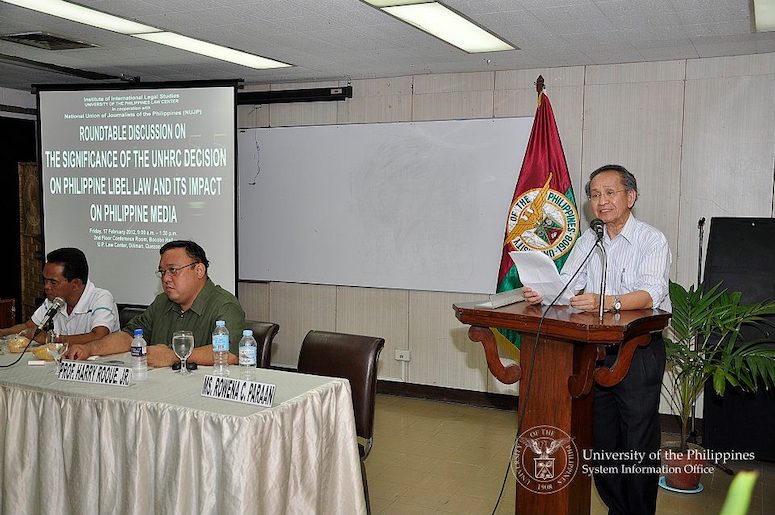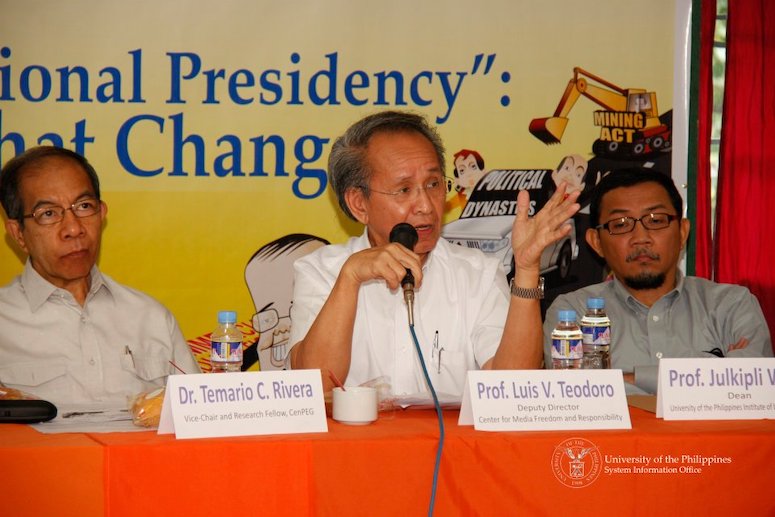The life and work of Luis V. Teodoro, the Filipino journalists’ dean
Former University of the Philippines College of Mass Communication (UP CMC) Dean Luis V. Teodoro, mentor and role model to generations of Filipino journalists, passed away on Monday, March 13. He was 81.
Dean Teodoro was an advocate of press freedom and responsible journalism–causes that were reflected in his work as deputy director of the media NGO Center for Media Media Freedom and Responsibility (CMFR).
He was editor of Philippine Journalism Review Reports, CMFR’s media monitoring publication. A well-respected teacher and media critic, his comments on the press were widely regarded by the media community.
Advocate of press freedom and responsible journalism
In 2019, Dean Teodoro received the Titus Brandsma Freedom of the Press Award from the Order of Carmelites for being “a journalist, editor, and journalism educator whose incisive critiques of Philippine media have inspired generations of media practitioners and scholars.”
He taught students and his readers that journalism should go beyond news reporting. For him, interpreting the news and providing context are needed for journalism to fulfill its role of providing information that can help people make decisions on issues that affect their lives.
“Getting the facts is indispensable in journalism, but is only the beginning of every journalist’s task. They must provide not ‘just the facts’ but also their meaning, and the only way they can do that is to contextualize the news and subject it to explanation and analysis,” he wrote in an article for PhilStar Life.
Dean Teodoro also supported and was part of the alternative press in the Philippines, which he describes as the part of the press that, during periods of crisis in the country’s history, resurfaces to report on topics that the mainstream media does not report because they are “either too timid or too involved with” these issues.
He was the founding chairperson of Altermidya, a network of progressive media outfits reporting on the concerns of marginalized sectors. During the latter years of the Marcos dictatorship, he was editor of the Philippine News and Features, an alternative news agency initiated by the Catholic Bishops Conference of the Philippines.
His opinion pieces in his Vantage Point column in the broadsheet BusinessWorld covered media, politics, human rights, and international affairs. The column appeared in the past on Business Mirror, Today, and ABS-CBN News Online and are archived on his website, luisteodoro.com. He was also a much sought-after resource person for journalists, students, and organizations.

Filipino journalists’ dean
He served for only two consecutive terms as dean of UP CMC from 1994 to 2000. But for many journalists and UP CMC alumni, Dean Teodoro was always the dean. In conversations between many journalists, the dean means Dean Teodoro.
The professor was thrice chair of the college’s journalism department and taught various journalism subjects during his decades of service. His former students, however, remember him most for his subject in journalism ethics. When faced with ethical dilemmas in their jobs, they recall what the professor taught them in the classroom.
He inspired many to seriously pursue journalism as a vocation, but he was also known in class for his amusing expressions like “anyway” and for making funny faces while giving his lectures. This collection of testimonials for the professor’s 65th birthday gives a glimpse of how he was as a leader and mentor at UP CMC.
During his time as dean, the Commission on Higher Education named UP CMC’s journalism program as Center of Excellence for Journalism for the first time. In 2007, Diwa Learning Systems recognized the former UP CMC dean as one of the honorees in “The Many Faces of the Teacher.”

Product of the ‘University of the People’
Dean Teodoro graduated from UP with a degree in A.B. English major in journalism and creative writing in 1964. He also attended the Master of Arts Program of the UP Asian Center of the University of the Philippines. He was editor of the Philippine Collegian, the official student publication of UP.
Writing about UP, he said being a university of the people means “offering a kind of education that’s devoted to both nation and country rather than to self.”
“It’s always been implicit in UP culture — the assumption that, having been educated by the people whose taxes support UP, graduates will give back something in terms of using their skills and knowledge to help the people realize their aspirations for a better, more just, more equitable society. It’s summed up in the admonition, known to every UP student, to ‘serve the people.’”
“It’s a commitment that should occupy a special place in every UP student’s and alumnus’ heart,” he added.
Book author and editor
Dean Teodoro wrote a number of books on media and journalism, including In Medias Res: In the Middle of Things: Essays on the Philippine Press and Media. His Vantage Point: The Sixth Estate and Other Discoverieswon as the Best Book for Journalism in the 2015 National Book Awards.
The Undiscovered Country, his collection of short stories published in 2006 by the UP Press, includes Don Carlos Palanca Memorial Awards for Literature, Philippine Free Press, and Carlos P. Romulo award-winning fiction.
He was editor of United States: Out of This Struggle: The Filipinos in Hawaii, published by the University Press of Hawaii in 1981. He also edited “Struggle for Nationalism and Democracy,” a book by Filipino revolutionary Jose Maria Sison, Dean Teodoro’s colleague in the Philippine Collegian and Progressive Review.
Dean Teodoro on martial law and remembrance
Dean Teodoro was among the journalists who questioned before the Supreme Court the legitimacy of Ferdinand Marcos’ declaration of martial Law. He was imprisoned for seven months, from October 1972 to May 1973.
In a paper read during the Memory, Truth-telling and the Pursuit of Justice: A Conference on the Legacies of the Marcos Dictatorship in September 1999, he enumerated the negative legacies of authoritarianism on the Philippine media.
“Yet these legacies are mostly unremarked upon, perhaps because there is no culture of continuity in Philippine society through which the lessons learned by previous generations is transmitted to the next,” he lamented.
He said remembrance is the only antidote to the return of authoritarian rule, but added that among the enduring legacies of martial law was its own repeatability.
“Authoritarian rule, including the undeclared kind, can happen again because too many Filipinos still don’t know what happened from 1972 to 1986, let alone why it happened. About the martial law period they have nothing to remember, and they won’t know it when they see it,” Dean Teodoro said.
What the well-loved professor said almost a quarter of a century ago still rings true today. He left in an era when journalism struggles amid disinformation, at a time when the people of this nation he often referred to as “the country of our sorrows” prefer forgetting over remembering.


